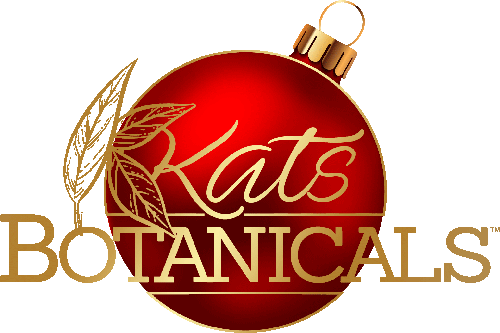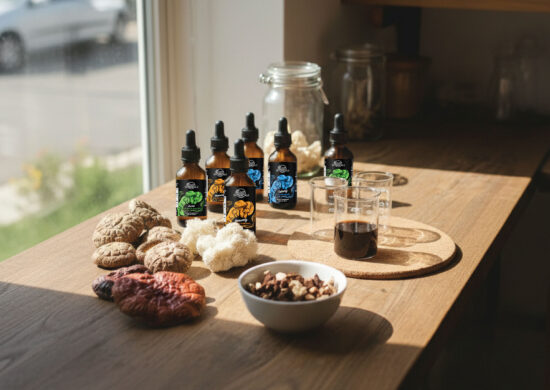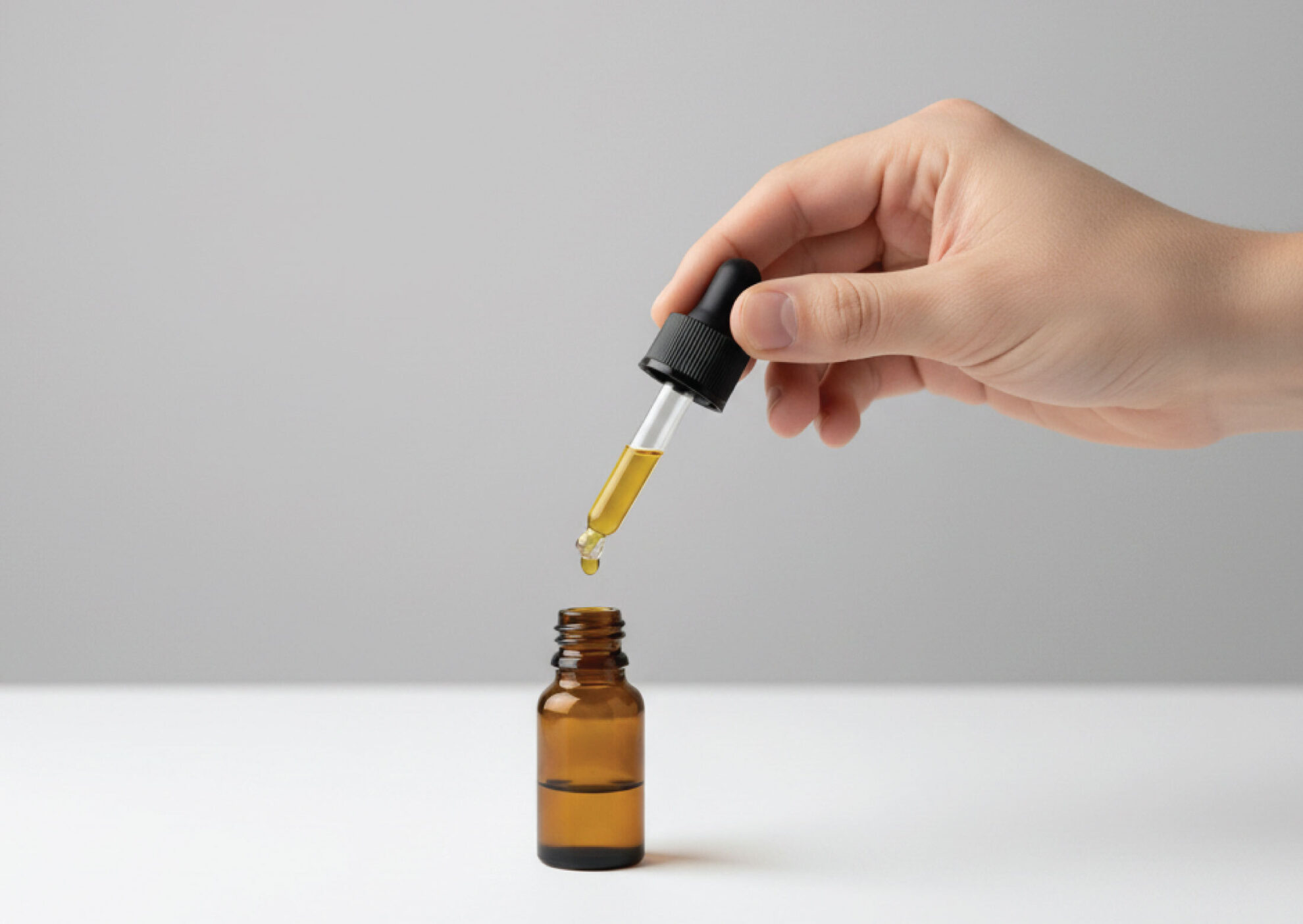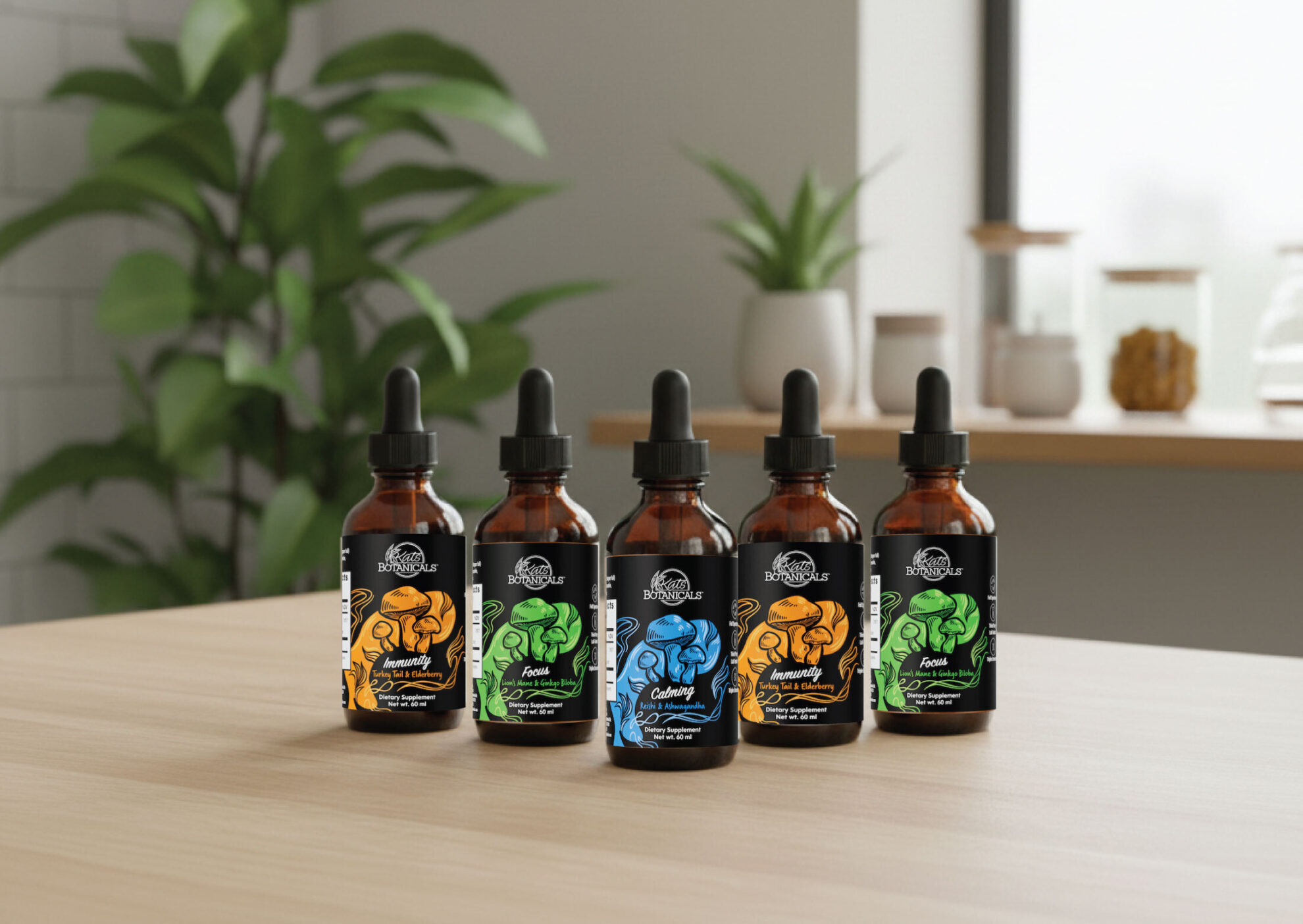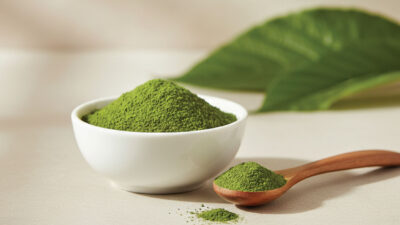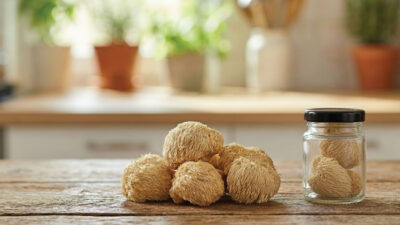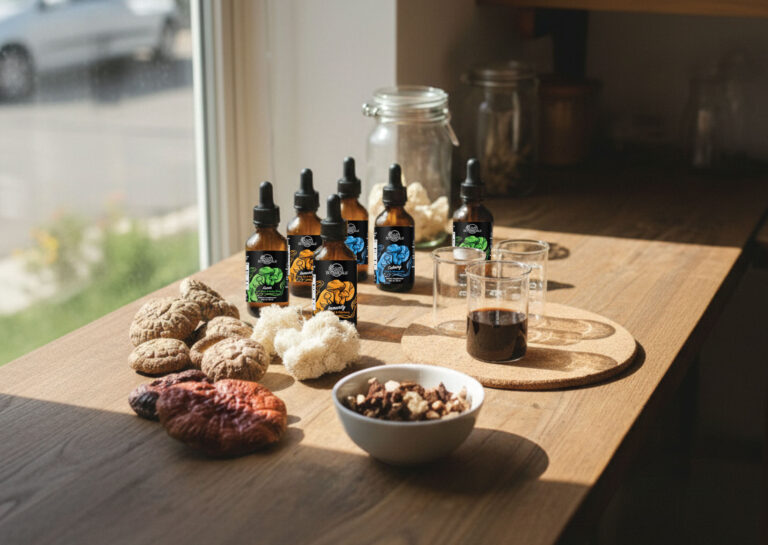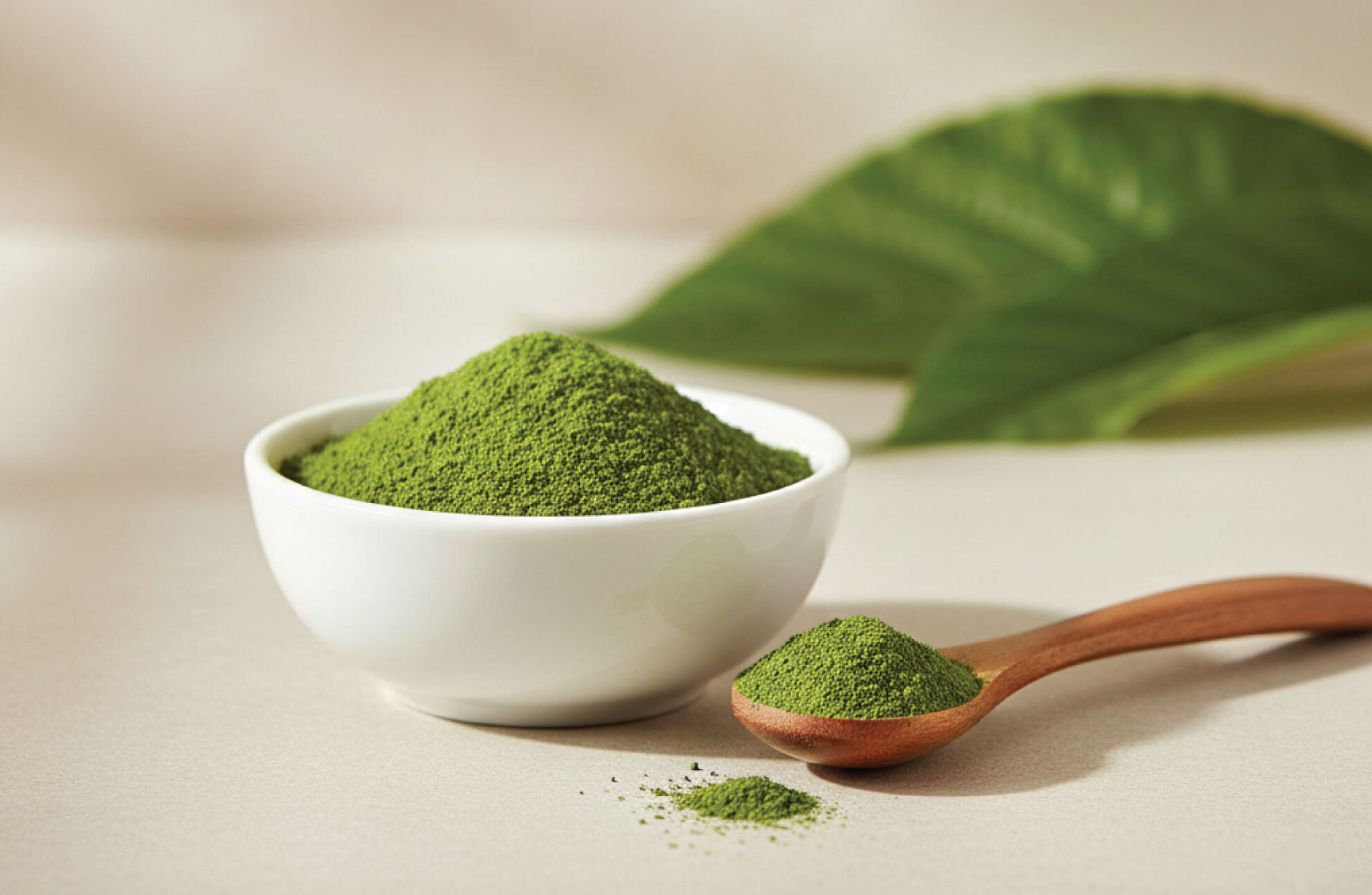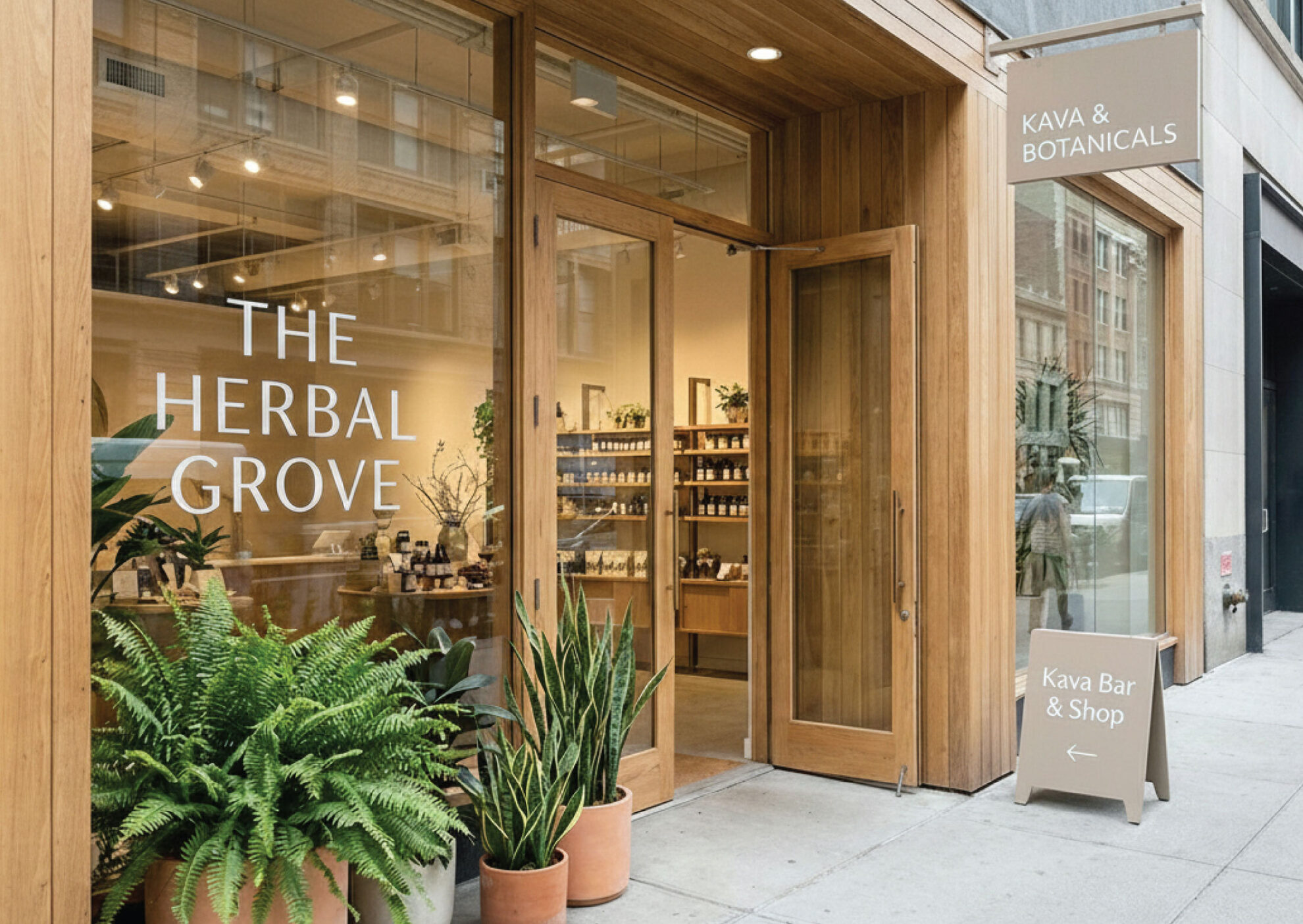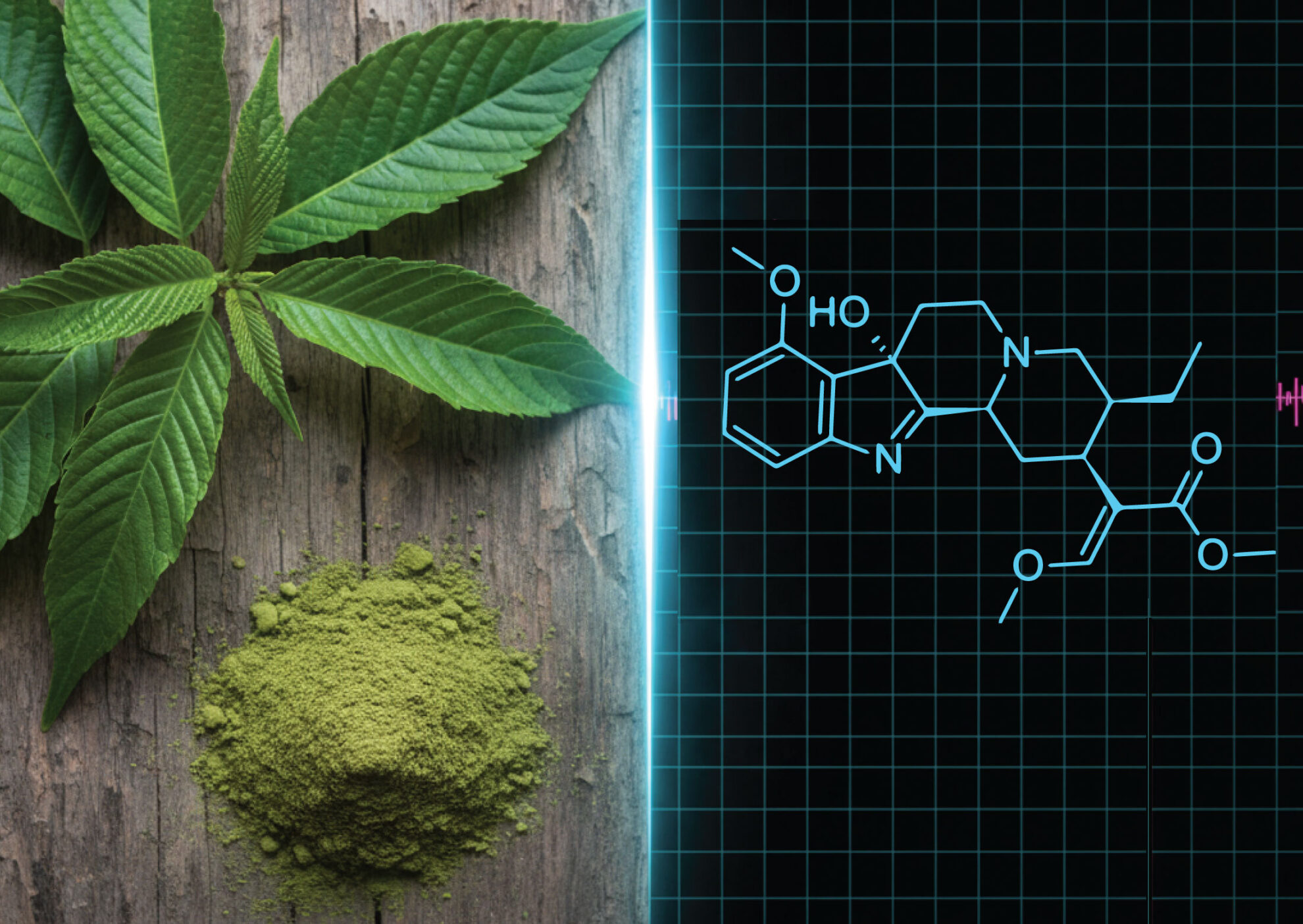Mushroom tinctures are growing in popularity. Tinctures, or concentrated liquid extracts, offer medicinal fungi in a fast-acting, easy-to-use form.
But do mushroom tinctures work? Research and user experience both imply yes. But as with other botanical supplements, quality matters. And it’s essential to learn how to use them correctly for your body.
There are other essential things to learn about mushroom tinctures. Like, the types of mushroom species, how they are extracted, and where these mushrooms are sourced. These variables can help you pick the best mushroom support and use it confidently.
This guide provides an in-depth look at functional mushroom benefits and how these tinctures are made. We’ll cover the different species, what the science says, and how to select high-quality products—like these functional mushroom tinctures from Kats Botanicals!
Do Mushroom Tinctures Work?
The tincture forms can work better than other options you may see online. This is because liquid extracts have higher bioavailability than powders or capsules. Tinctures concentrate the bioactive compounds in mushrooms into a liquid form that is easily absorbed.
Effectiveness depends on a few key factors, which we’ll cover in a moment.
What Are Mushroom Tinctures?
Tinctures have been used for centuries to preserve and concentrate plant compounds. Mushrooms like Reishi and Chaga were steeped into tonics across Asia and Northern Europe. Today’s tinctures use these traditional methods with more control and consistency.
A mushroom tincture is a liquid extract made by soaking mushroom material in alcohol, water, or both. This concentrates the active compounds, making them easier to absorb than when eating whole mushrooms or powders. The final product is a concentrated liquid. You can take it under the tongue or mix it into beverages like tea or coffee.
Learn more: What Are Functional Mushrooms?
How Mushroom Tinctures Work in the Body
Because they are already in liquid form, mushroom tinctures are absorbed quickly into the bloodstream. This means they work faster than powders or capsules. Sublingual absorption (under the tongue) can make them work even faster.
There are an estimated 10,000 species of edible mushrooms on Earth. Only a fraction of these are considered medicinal. This is due to the various active compounds across medicinal mushroom species. Each affects the body in unique ways, according to scientific study:
- Beta-glucans: Found in Reishi, Chaga, and Turkey Tail mushrooms. Research highlights their interaction with immune cells and involvement in inflammatory pathways. See: PubMed’s article on mushrooms and immune modulation for more information.
- Hericenones and erinacines: Found in Lion’s Mane. Studies show they influence nerve growth factor, a protein connected to cognitive support. See: Neurotrophic and Neuroprotective Effects of Hericium erinaceus (Lion’s Mane).
- Triterpenes: Found in Reishi and Chaga. Research on the potential mechanisms of medicinal mushrooms suggests antioxidative stress support.
These are just a few examples of what the science says about the herbal benefits of mushrooms.
The body does not respond overnight, though. Many benefits develop gradually. With consistent daily use, the bioactive compounds accumulate in the system and interact with the immune and nervous systems to achieve optimal results.
Benefits of Mushroom Tinctures by Species
Do mushroom tinctures work for specific benefits? The answer depends on the mushroom and its bioactive compounds.
Research reviewed in a 2023 PMC study on medicinal mushrooms demonstrates some of the therapeutic benefits of mushroom supplementation. But each species offers something unique for your wellness routine.
Let’s take a look at some of the major players.
Lion’s Mane (Hericium erinaceus)
Lion’s Mane is among the most studied functional mushrooms. Lion’s Mane has been used in traditional Chinese medicine for digestion and general wellness. Today, research is examining its possible effects on brain health support. Compounds such as hericenones and erinacines are being studied for their potential effects on nerve growth factor. (A vital protein for healthy neurons.)
Some users take Lion’s Mane tincture for focus support and mental clarity. Reports also note reduced fatigue symptoms and steadier mood, though research is still emerging.
Explore Lion’s Mane and Ginkgo Biloba Mushroom Tincture for focus.
Reishi (Ganoderma lucidum)
Reishi is often called the “mushroom of immortality” in Asian traditions. It has been used for centuries to support calm, reduce fatigue, and boost the immune system. Its triterpenes and polysaccharides help regulate immune response and support liver health.
In tincture form, Reishi is often taken in the evening to promote relaxation and restful sleep. Users commonly describe it as grounding, making it a popular choice for people dealing with everyday stressors.
Shop Ashwagandha and Reishi Mushroom Tincture for calm.
Chaga (Inonotus obliquus)
Chaga grows on birch trees in cold climates and is valued for its exceptionally high antioxidant content. In folk medicine from Russia and Northern Europe, Chaga was brewed into teas to support stamina and overall wellness.
Chaga contains betulinic acid, melanin, and polysaccharides. These compounds may help neutralize free radicals. Chaga tinctures may support immune defense and overall cellular health. While it does not provide an immediate energy boost, many users describe Chaga as a long-term tonic for resilience.
Cordyceps (Cordyceps militaris)
Cordyceps is famous for its ability to support energy and endurance. Historically, wild Cordyceps was rare and prized in Tibet and China. Today, cultivated strains like Cordyceps militaris make tinctures more accessible.
Cordycepin, the main compound in Cordyceps, may improve oxygen utilization and support cellular energy production. Athletes often use Cordyceps tinctures to support stamina and post-workout recovery. Unlike caffeine, it tends to produce a more steady energy without jitters.
Explore Cordyceps and Rhodiola Tincture for energy.
Turkey Tail (Trametes versicolor)
Polysaccharide-K (PSK) and polysaccharide-P (PSP) are key compounds in Turkey Tail. They may support immune cell activity and gut health.
Turkey Tail tinctures are commonly used for daily immune support and overall wellness. Many users include it in routines to help maintain balanced immune function.
Buy Turkey Tail + Elderberry Tincture for immunity today!
How to Take Mushroom Tinctures
Tinctures usually come with a dropper for easy use. For faster absorption, place the drops under your tongue and hold them there for 20-30 seconds before swallowing. You can also mix them into beverages like tea or coffee to mask the taste.
Consistency is key. Using tinctures daily over several weeks tends to yield better results than just occasional use.
Dosage Basics
The following provides general guidance for adult use. Individual needs may vary, and tinctures should be used responsibly. Always consult a healthcare professional if you have health conditions, take medications, or are pregnant or breastfeeding.
| Metric | Amount | Notes |
| Starting dose | 1–2 mL/day | ~20–40 drops |
| Typical range | 1–4 mL/day | ~20–80 drops; adjust by mushroom type and tolerance |
| Conversion | 20 drops = 1 mL | Useful for precise dosing with droppers |
Effects vary depending on the mushroom species, brand, concentration, and the individual’s physiology. Learn more about mushroom tincture dosing at Pharmacy.com.
Recommended Read: Kratom Dosage Guide
Safety Considerations
- Age: 21+ recommended.
- Pregnancy/Breastfeeding: Avoid use unless cleared by a healthcare professional.
- Medications: Check for potential interactions, especially with immunomodulators, anticoagulants, or other supplements.
- Allergies: Individuals with known mushroom allergies should avoid tinctures.
Always consult a healthcare professional if you have health conditions, take medications, or are pregnant or breastfeeding.
Mushroom Tinctures vs Other Forms
Tinctures vs Capsules
Capsules are convenient and mask the mushroom taste but require digestion, which can slow absorption. Capsules can be an easy go-to option when on the go, but tinctures tend to be absorbed more quickly.
Tinctures vs Powders
Powders mix easily into foods or drinks but may not be as concentrated as tinctures. Some popular mushroom coffee products are made with mushroom powder.
Recommended Read: How to Use Kratom Powder
Tinctures vs Teas
Teas extract water-soluble compounds but take time and may miss alcohol-soluble compounds.
For a more detailed comparison of mushroom tinctures vs powders, capsules, and teas, see the chart below. We’ve included extracts, which are highly concentrated tinctures and are often far more expensive to use. This comparison highlights the pros, cons, bioavailability, and typical uses of each.
Want to make tea at home? Try checking out the best recipes on how to make kratom tea here!
Mushroom Tinctures vs Powders, Capsules, and Teas
| Form | Pros | Cons | Bioavailability | Use Case |
| Tinctures | Fast absorption, convenient, preserves both water- and alcohol-soluble compounds | Strong taste, dose measured in mL/drops | High, liquid form allows sublingual uptake | Daily supplementation for overall wellness |
| Extracts | Concentrated, full-spectrum, standardized potency | Can be expensive, may require precise dosing | High, depends on extraction method | Targeted use for specific compounds |
| Powders | Versatile, mix into smoothies or foods, easier taste | Requires digestion, may not be as concentrated | Moderate, bioavailability lower than tinctures | Cooking, smoothies, or supplement stacking |
| Teas | Traditional, warming, hydrating, gentle | Time-consuming, may not capture alcohol-soluble compounds | Moderate, water-soluble only | Daily ritual, gentle immune support, hydration |
How Mushroom Tinctures Are Made | Mushroom Tincture Extraction
Most reputable mushroom tinctures use a dual-extraction process, combining alcohol (to extract triterpenes) and hot water (to extract polysaccharides like beta-glucans) to create a broad-spectrum tincture.
Making your own mushroom tinctures at home can be challenging. DIY tinctures require:
- High-proof alcohol and quality mushroom material
- Knowledge of extraction methods to capture both water- and alcohol-soluble compounds
- Careful handling and storage to avoid contamination or spoilage
- Patience, as dual extraction takes weeks
- Attention to consistency, as potency and concentration can vary batch to batch
For these reasons, commercial, lab-tested products are generally more reliable. Lab-tested tinctures include a certificate of analysis (COA) showing potency, purity, and safety, and their packaging ensures product freshness and ease of use.
Kats Botanicals provides COAs for all products, including our line of functional mushroom supplements. Learn more about our cGMP practices.
Quality Matters: What to Look For
Not all tinctures are equal in strength or purity. Choosing high-quality products ensures you get measurable amounts of the compounds linked to real health benefits.
Tincture Quality Checklist
- Fruiting body preferred over mycelium (The FDA requires label distinction for products made with mycelium.)
- Full-spectrum dual extraction
- Certificate of Analysis (COA) confirming identity, potency, and contaminants
- Produced under cGMP standards
With Kats Botanicals, high quality is our baseline. This is why our standardized mushroom tinctures are top-grade. Every bottle, every order.
We believe in the wholesome health benefits of a range of natural mushroom compounds. We offer a variety so you can select the perfect ones for your routine. As always, we back them with our 100% Customer
Satisfaction Guarantee.
FAQs About Mushroom Tinctures
Mushroom tinctures are concentrated liquid extracts made from functional mushrooms. They are typically made with a dual-extraction (water + alcohol) to extract active compounds such as β-glucans, hericenones, and cordycepin.
Effects vary by individual. Some notice benefits like clearer focus support, better sleep patterns within days, while others require weeks of consistent use. Factors include lifestyle, diet, stress, and baseline health.
Some effects may be felt within 20-30 minutes, especially with sublingual use. Long-term benefits, such as cognitive or balance support, usually require daily use over several weeks.
Tinctures often provide faster and more complete absorption, especially for alcohol-soluble compounds. However, capsules and powders are effective too, especially when extracted properly. Preference comes down to convenience and personal goals.
For most healthy adults, tinctures are considered safe when taken as directed. People with fungal allergies should avoid them. It’s recommended to consult a doctor before use. Especially if you have health concerns, take medications, are pregnant, or breastfeeding.
See our top tips for finding the best Kratom vendor online here.
Many people stack tinctures with other botanicals, like Ashwagandha, vitamins, or CBD products. This makes it easy to create a personalized routine. That said, it’s best to ask your doctor about potential interactions.
Interested in stacking? Check out our detailed guide to everything you need to know about Kava vs Ashwagandha.
Yes. Most tinctures remain potent for one to two years if stored in a cool, dark place. Alcohol acts as a preservative. But tincture potency still gradually declines over time.
Final Thoughts
So, do mushroom tinctures work? Yes, for many people, they offer the benefits of functional mushrooms in a convenient form. But they need to be made properly and used consistently. Stick with well-labeled, lab-tested tinctures from reputable brands.
Each species you try will have a slightly different wellness profile, so be sure to research them individually to select the best ones for you. Mushroom tinctures are steady, natural allies for long-term wellness, not quick fixes. Stick with them and you may find natural support your body craves!
Another thing to stick with along your wellness journey is us! Kats Botanicals is a leader in plant-based care. We provide a wealth of informational articles about natural supplements and their ingredients. We also carry a variety of natural botanical supplements, so you can pick your journey well-informed!
Disclaimer: These statements have not been evaluated by the Food and Drug Administration. This product is not intended to diagnose, treat, cure, or prevent any disease.
